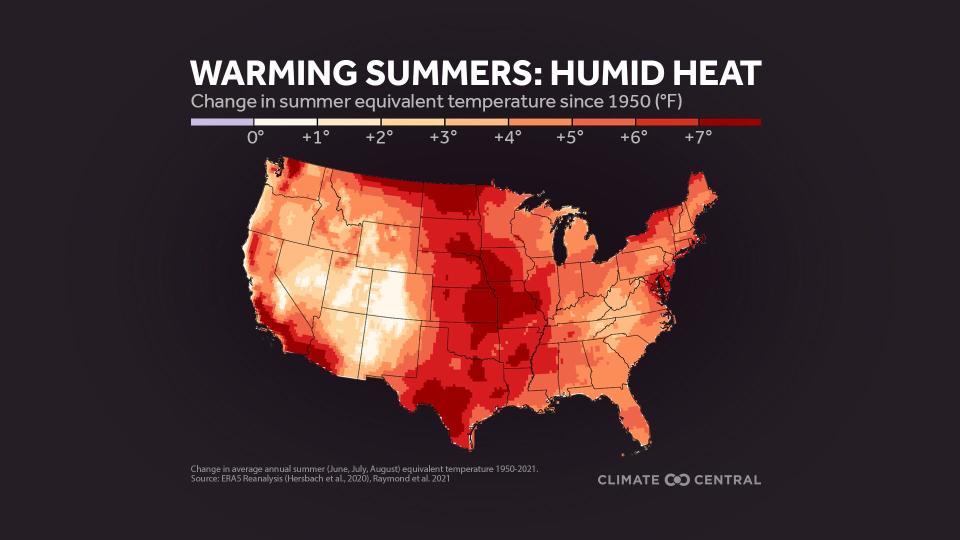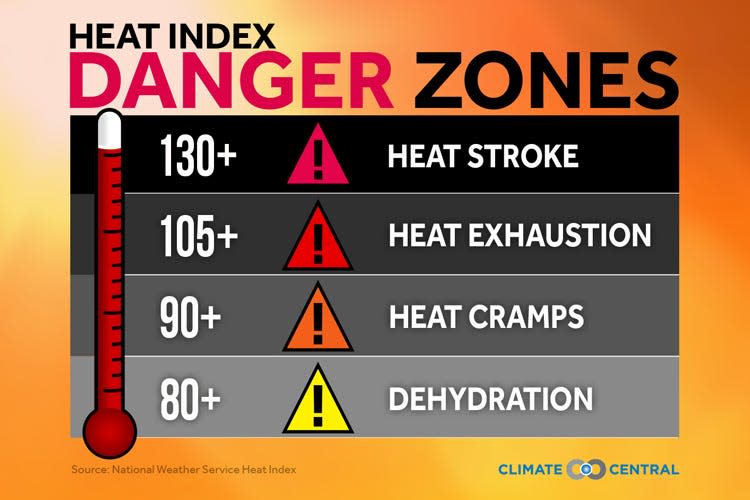Knowing the heat index can save you on a hot summer day. What else do you need to check?
WORCESTER – Have you ever watched the nightly news and heard the meteorologist mention the “feels like" temperature. Do you know what that means?
Understanding it in this warming climate crisis is vital.
As Bryce Williams, a meteorologist at the National Weather Service in Norton, explained, it’s a term that is easier on the ears to describe how hot it feels outside, compared to the more technical “heat index.”
Forecasters don’t want to overload us with jargon, so they go with the more common feels-like temperature. But it’s important to understand what heat index means, because it might have more to do with staying healthy than knowing how hot it is on a thermometer.
Especially if we're looking for an accurate gauge to tell us if it's safe to go outside and tackle that home repair project we've put off for months or starting a daily jog. These considerations take on added importance during climate change, when the plant is warming to dangerous levels that are responsible for heat domes in Texas and out-of-control wildfires in Canada.
“(Heat index) is a truer gauge of the impact on the body from temperature,” Williams said.

Air temperature and relative humidity = heat index
In simple terms, heat index is a combination of air temperature and relative humidity. When relative humidity is elevated, the body has a hard time cooling itself down and that can be a dangerous proposition.
To maintain a safe body temperature, we naturally sweat on hot days. Our sweat evaporates, acting like a natural air conditioner that keeps our bodies running at a safe, cool temperature. But if humidity levels outside are elevated and our sweat isn’t evaporating at a pace to keep our inner temperature properly regulated, the result can range from mild fatigue to severe dehydration to dangerous heat stroke.
In some instances of prolonged activity in extremely humid conditions, death is a possibility.
High humidity could be a consistent threat in Worcester in the years ahead, as climate change is predicted to bring more heat waves to New England's second-largest city.
A heat wave is defined as three or more consecutive days with temperatures at or above 93 degrees.
According to First Street, the likelihood of a heat wave in Worcester 30 years ago was 18%. This year, it jumps to 48%, and reaches a whopping 80% in 30 years.

Wet bulb temperature: Better than heat index?
The heat index was proposed and developed by the National Weather Service, said Larry Kenney, a professor of physiology and kinesiology at Penn State University.
Kenney told SciLine last month that there is a problem with using the heat index for human health and safety - it's a perceptual index. That means it's truly a question of how hot we feel, not the effects of that heat and humidity on the human body.

A better measurement that many people have used, according to Kenney, is something called wet bulb temperature. It involves taking a typical mercury thermometer and putting a wick over the bulb and then saturating that wick with water. As water evaporates from that wick, it cools down the temperature displayed by the thermometer.
It's like a human sweating and evaporating that sweat, said Kenney, who noted that wet bulb temperature is coming into its own as a new, well-developed index.
"It’s not perfect - doesn’t account for radiation from the sun, for example - but it’s much better than the heat index because it’s much more physiological," Kenney said.
Heat index used to make important weather warnings

Williams explained that the National Weather Service uses heat index readings when decisions are made to issue heat advisories or excessive heat warnings. Neither were issued Thursday in Worcester, when the official temperature recorded by the National Weather Service topped out at 89 degrees.
HIGHER READING: Did you know that the heat index at 3 p.m. July 6 was five degrees higher than the thermometer temperature, with a reading of 94? The five-degree swing remained at 6 p.m., when the air temperature was 85 and the heat index was 90.
FORECAST: Heat index dominance over air temperature could continue for the next few days, as Williams expected hot and humid conditions to run longer, with temperatures falling in the low 80s to upper 90s. We could see a break starting in the later part of the weekend into Monday, when the temperature is expected to fall to around 80, with some showers forecasted.
The Telegram & Gazette is investigating the effects of a rapidly heating planet on people who live in our city. Follow along with "City on Fire" as we report the struggle with summer temperatures, even in New England. This is part of the USA TODAY project Perilous Course. Contact reporter Henry Schwan to be included in a story if you have been affected by heat: expense of air conditioning or lack of it, health risks, less access to green space, concern about pets and animals in the summer conditions, worry about an older loved one, etc.
Contact Henry Schwan at henry.schwan@telegram.com. Follow him on Twitter: @henrytelegram.
This article originally appeared on Telegram & Gazette: What does the heat index mean: New metrics help summer safety choices

